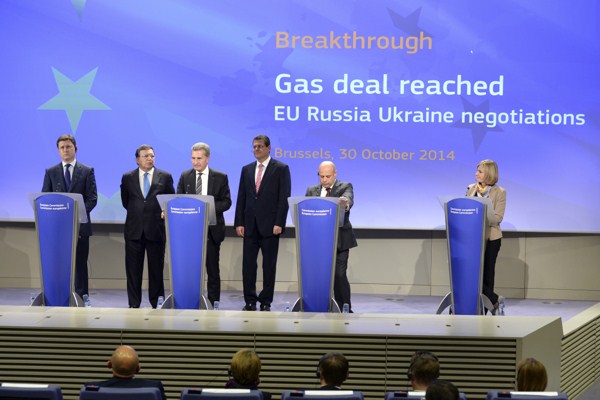Yesterday, Russia and Ukraine reached a gas deal after months of tense negotiations against the backdrop of violence in Ukraine’s east that has left more than 3,700 people dead. The agreement took place just days after Ukraine’s snap parliamentary elections, which showed surprisingly robust support for pro-European parties. But challenges remain, both in the east, where pro-Russian separatists will stage their own unsanctioned elections this weekend, and in Kiev, where the government must overcome a legacy of corruption and dysfunction.
The elections have been hailed as a triumph in the West, and for good reason. Ukrainians resoundingly rejected the far-right party Svoboda, which Moscow has portrayed as the “fascist” leading force behind the protest movement that overthrew former President Viktor Yanukovych earlier this year. Svoboda received less than 5 percent of the vote, the minimum threshold for seats in parliament. Just barely clearing that threshold was the Fatherland party led by former Prime Minister Yulia Tymoshenko, whose attempt to rebuild her political standing after being jailed by Yanukovych has stalled, and who is widely seen as a compromised figure due to her abuse of power while in office.
The big winners were the People’s Front, led by current Prime Minister Arseniy Yatsenyuk, and the Petro Poroshenko Bloc, named for the current president and led by boxing champion and Kiev Mayor Vitali Klitschko. Each won roughly 22 percent of the vote, with a tiny lead for Yatsenyuk’s party. But that lead is important, as it may allow Ukraine’s governing coalition to avoid an internal struggle over the prime minister’s office. Yatsenyuk and Poroshenko are both seen as pragmatists who have a good working relationship, which so far has allowed them to appeal to Europe and the United States for support. By forming a majority coalition with Self-Reliance, a pro-European center-right party that received over 10 percent of the vote, they can continue to lead Ukraine in the direction of the European Union. However, tensions between presidents and prime ministers have repeatedly hobbled Ukraine over the past decade, and Poroshenko and Yatsenyuk’s alliance may not last.

